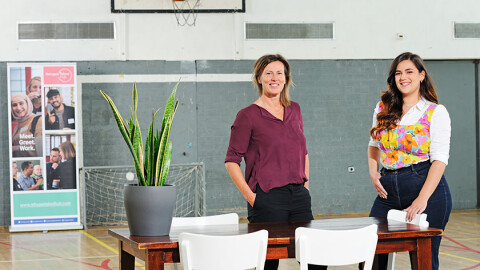
23 september 2022
Je moet naar de mens kijken
Nederland telt enkele honderdduizenden inwoners met een achtergrond als vluchteling. Veel van hen komen niet makkelijk aan het werk. In samenwerking met stichting Refugee Talent Hub bood ABN AMRO ruim tachtig mensen met een vluchtelingenachtergrond een baan aan, met nieuwe doelstellingen voor de komende drie jaar. Eenmaal binnen gaat er een nieuwe wereld open – niet in de laatste plaats voor medewerkers van de bank.

Taalbarrières, trauma’s, cultuurverschillen – werkgevers hebben hun vooroordelen snel klaar als het gaat om arbeidsplaatsen beschikbaar stellen aan mensen met een vluchtelingenachtergrond. Chani Savelberg, Diversity and Inclusion Consultant bij ABN AMRO, en Wilma Roozenboom, Directeur van Refugee Talent Hub, bespreken deze issues en dagen bedrijven uit om ook zelf in de spiegel te kijken. Want liggen de obstakels niet stiekem bij onszelf? Hoe open is de bedrijfscultuur? Hebben we vooroordelen? En is het systeem niet ook deels verantwoordelijk voor ‘de afstand tot de arbeidsmarkt’ die aan vluchtelingen wordt toegeschreven?
Draagvlak creëren
Natuurlijk kunnen vluchtelingen zelf het één en ander doen om aan de slag te komen: de taal leren, een netwerk opbouwen, hun diploma’s laten waarderen. Maar er ligt ook een verantwoordelijkheid bij werkgevers. Bedrijven moeten zélf willen veranderen, vertelt Wilma. “Daarom ondersteunen wij bedrijven en organisaties in het creëren van draagvlak op de werkvloer. We bieden bijvoorbeeld mentortrajecten aan en workshops voor HR-personeel. In een extreem geval kan het wel een jaar duren voor een bedrijf klaar is om iemand met een vluchtelingachtergrond als collega te verwelkomen. Gelukkig gaat het meestal een stuk sneller.”
Kijk naar de mens en het talent
Mensen en dus ook organisaties moeten helemaal anders naar deze groep gaan kijken, betoogt Wilma. Daar waar we bij een vluchteling al snel denken aan een hulpbehoevend persoon, is het eigenlijk vaak gewoon een professional die door omstandigheden gedwongen is om zijn of haar land te verlaten. En die ernaar smacht om eindelijk weer eens te worden aangesproken als accountant of data-analist. Wilma: “De term vluchteling slaat op iets wat je ooit is overkomen, maar het bepaalt niet je identiteit. Vanuit Refugee Talent Hub proberen wij bedrijven uit te dagen om de mens en het talent te zien en niet – of in ieder geval niet alleen - de vluchteling.”
Tachtig statushouders
ABN AMRO begon in 2017 met het programma Reboot, waarin de bank mensen met een achtergrond als vluchteling aan een baan helpt. Sinds het begin zijn ruim 80 ‘Rebooters’ bij ABN AMRO aan de slag gegaan, mede dankzij het netwerk van Refugee Talent Hub. De resultaten zijn dermate positief dat de bank nog extra gas geeft: de komende drie jaar wil ABN AMRO nog zestig statushouders aan een baan helpen. Ook vluchtelingen uit Oekraïne zijn meer dan welkom om bij de bank aan de slag te gaan. Zij hebben officieel geen verblijfsstatus nodig en komen daarom bovenop de twintig plaatsingen per jaar.
Win-win
Mensen zien het aannemen van vluchtelingen soms als een daad van liefdadigheid, constateert Chani. Maar het gaat om een win-winsituatie. “Natuurlijk is het onze taak om, vanuit onze purpose ‘Banking for better, for generations to come’, bij te dragen aan een betere wereld. Maar we hebben het hier over talent, waar we als organisatie gewoon beter van worden. Het mes snijdt aan twee kanten.”
Voorbij het CV kijken
ABN AMRO en Refugee Talent Hub organiseren elk kwartaal een evenement om kandidaten en managers met elkaar in contact te brengen. Bijvoorbeeld via een speeddate of een pitch event. Persoonlijk contact is daarvoor essentieel. “In het werken met vluchtelingen moet je geen vinkjes willen zetten, want dan kom je er niet”, zegt Chani. “Deze events bieden ons de mogelijkheid om voorbij het cv te kijken en te focussen op de kansen en de mogelijkheden.”
De evenementen hebben een hoog slagingspercentage. In de laatste ronde (voorjaar 2022) kwamen elf statushouders bij ABN AMRO op gesprek. Tien van hen zijn aangenomen, als data-analist of -engineer bijvoorbeeld. Zij krijgen daarbij ook toegang tot mentortrajecten en taalles. Intussen krijgen ook medewerkers van de bank nieuwe mogelijkheden om een steentje bij te dragen. Zij kunnen zich opgeven om vluchtelingen te helpen met hun cv of sollicitatiegesprekken. Ook geeft de bank voorlichting aan andere organisaties die met statushouders willen werken – en met de aanhoudende krapte op de arbeidsmarkt zijn dat er steeds meer.
Opleidingsprogramma
En die bezwaren en vooroordelen? Die verdwijnen in de praktijk snel naar de achtergrond. Wilma: “Die vallen weg op het moment dat je iemand ontmoet. Een van die vooroordelen is het idee dat alle vluchtelingen getraumatiseerd zijn. Ja, voor sommigen geldt dat zeker. Maar dat heeft niet altijd gevolgen voor het werk. En daarnaast geldt: een baan werkt vaak helend. Een trauma kan verminderen door het ritme en de afleiding die werk biedt.”
Samen met Microsoft en Refugee Talent Hub is ABN AMRO een opleidingsprogramma begonnen. In een traject van twintig weken worden mensen met een vluchtelingenachtergrond klaargestoomd voor een baan als IT-specialist bij de bank – inclusief intentieverklaring voor een baan. “Hoe meer mensen we plaatsen, hoe groter het enthousiasme”, zegt Chani. “Managers verwachten rugzakken en obstakels, maar het tegendeel is waar. Medewerkers met de vluchtelingenachtergrond brengen een ander perspectief met zich mee, we leren anders te kijken naar onszelf. Dan vertellen managers me: ik had niet verwacht dat ík er zoveel van zou leren. Dat is toch prachtig?”
Bron: ABN AMRO